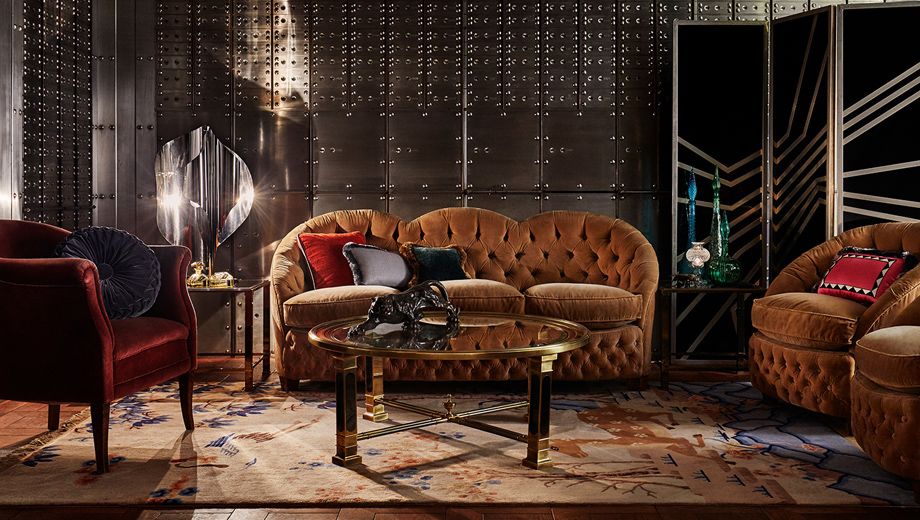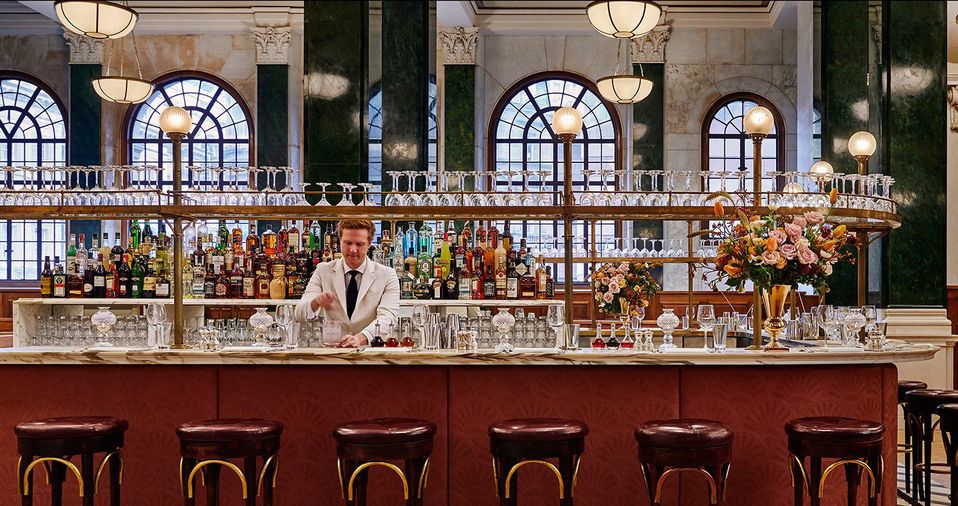London's amazing new business hotel is more like a private club

Don’t even think about calling the Ned a business hotel.
Yes, behind its grand 1920s Midland Bank facade it's the size of a convention center property, with 320,000 total square feet of space. And yes, it's located smack in the middle of the City, London’s finance and business core.
But a business hotel is the very last thing the Ned’s founders set out to create. Based on repeated warnings from their handlers, they seem to consider those two words nothing short of anathema.
The Ned is the first collaboration between Andrew Zobler and Nick Jones, red-hot hoteliers with a gift for attracting the crème de la crème of the creative class.
Jones founded Soho House, while Zobler is chief executive of Sydell Group, which develops and operates such acclaimed properties as the Nomad in New York, the Freehand in Miami and Chicago, and the Line in Los Angeles and Washington, D.C.
An urban resort is the more appropriate term, they say. Yet when it opens on April 27, the Ned will be the best business hotel in town, make no bones about it.
Blockbuster proportions
If Jones’s Soho House hotels have been like indie movies, as he characterized them in an interview, then this is his big blockbuster.
The project is massive in both size and investment: 252 rooms in 13 categories; seven public restaurants; a private members’ club; three bars; a rooftop pool; six meeting and event spaces; a barbershop; a women’s hair studio; separate salons for facials and skin rejuvenation, make-up, and nails; a fitness club; and a spa.
While the team declined to comment on their total budget, the recent restoration of the glitzy Corinthia, another sprawling London hotel, cost a cool US$490 million. And despite the prowess of both hoteliers, neither was willing to tackle the project alone.
“Nick had never done anything of this scale, but he understands London as well as anybody and has a great aesthetic and style,” Zobler said of their partnership. “We understood the hotel business and development very well. Together we made a great team.”
Jones concurred: “We’ve been responsible for the design, and they've been responsible for the implementation—it’s been a super-successful collaboration.”
Bigger Is better, for business and leisure
“Lifestyle hotels used to be synonymous with this idea of ‘boutique,’” said Zobler. “Small meant better. More intimate.” He sees that changing. “Growing in scale means you can offer a larger range of amenities,” he explained.
Those separate men’s and women’s salons perfectly prove the point: They’ll come in handy whether guests are going to black-tie weddings or buttoned-up board meetings.
Ditto the meeting rooms with private terraces or the 24-hour British brasserie called Millie’s (as convenient for locals’ post-party munchies as it will be for suits with late-night flight arrivals).
“Nobody wants to stay in the same boring business hotels with the same restaurant menus and the same ugly awnings,” said Jack Ezon of Ovation Travel, whose company books at least 30,000 corporate room nights in London annually.
“You want a cool place with a great vibe that gets you in a good mood, especially if you’re entertaining. And if you can combine that with big, nice rooms, it’s even better,” he added.
The Ned, he says, ticks those boxes. Entertaining will be easy, with eight restaurants that include a sister to Cecconi’s in Mayfair; a Jewish deli; a Parisian-inspired café; and several spaces that will be for guest use only, such as a bar in the bank building’s old vault space, a rooftop grill, and a ritzy American steakhouse.
“For business travelers, the Ned is a game-changer,” said Ezon, estimating that the project will likely see 60 percent to 80 percent of its occupancy checking "business" on their immigration forms.
Public-private offerings
“You have to be a member to walk into a Soho House building, but a good night at the Ned will see every sort of person in there—that’s what will make it interesting and exciting, I think,” said Jones, whose previous projects have always been characterized by a sense of exclusivity. “The Ned is for everyone.”
Yet that’s not entirely true. While most of the restaurants and public spaces will in fact be open to the public, a private membership club will still give the Ned an elite bent.
Included in the membership cost (which starts at £1,500, or US$1,880) is access to a series of private spaces, such as the aforementioned restaurants, a marble-clad gym, and a spa with a hammam, sauna, and swimming pool.
Perhaps the hardest tables to book on property will be those at the Princes Dome and Poultry Dome bars, two visually spectacular watering holes built into round rooftop atriums.
Although exclusivity is a long-held focus of Soho House clubs, getting admitted here won’t require you to be a creative professional. The hotel’s position in the City will force it to open its network beyond the traditional editorial, art, and fashion types.
“What we’re really hoping for is a blend of people,” said Zobler, who said that “getting the alchemy right” would require a diverse mix of business travelers, startup entrepreneurs, transient locals, leisure types, and beyond. “We’re trying to cultivate that through the diversity of the offerings,” he explained.
Financial districts on the upswing
Until now, there have been few exciting places to stay in the City, except for an Andaz, an Indigo, and a few unbranded, unremarkable crash pads. But that’s changing, and not just because of the Ned.
Ezon says the recently opened Four Seasons Ten Trinity – also in a historic building with a private members’ club – is another noteworthy City site, despite having a more traditional feel.
“They’ll cater to a similar comp set but a different psychographic,” explained Ezon. “One for the more trendy, and one for the more traditional.”
Zobler hopes bringing the cool-kid cred to the City will help change the neighborhood even further. “The center of gravity in London has really moved east. You used to want to stay in the West End and went to the City just to do business.
Now that so much has moved east to Shoreditch and beyond, the City has actually become a great hub,” he said. To his point: Nightlife, shops, and tech companies have moved in, and restaurants are expanding their hours past 8pm for the first time.
London isn’t alone in this regard. One of the hottest new hotels in New York, the Beekman, is also in an historic building in the once-bland Financial District. And in Los Angeles, Zobler is developing a Nomad downtown rather than in glamorous Santa Monica or Beverly Hills.
“Financial districts tend to have these old incredible buildings, and people have a yearning to be in places that have a sense of history,” he said.
Plus, good real estate deals bring in a creative, regenerative energy. “In the coming years, you'll see the City’s office spaces – they're reasonably priced and well connected [to public transportation]–being filled up by interesting tech and advertising firms,” predicted Jones.
The bottom line
“Business hotels need to learn to cater to a younger demographic,” said Ezon. “They need to capture local energy and have some life to them.” That’s exactly what the Ned is designed to do.
So call it an urban resort if you must, but we’ll raise our glass to Zobler and Jones for creating the business hotel of the future—one that’s not strictly for business at all.
The Ned opens April 27. Rooms start at £250 (US$313).



Hi Guest, join in the discussion on London's amazing new business hotel is more like a private club